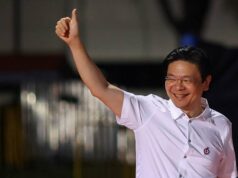Role Reversal : G-7 trade ministers vow to further unite against economic coercion

The very countries who for last 500 years were coercing the rest of the world economically, militarily and politically are now getting together to unitedly fight economic coercion, mainly from China.
Trade ministers from the Group of Seven industrialized nations said Sunday they were “disturbed” by the growing recurrence of coercive economic measures and vowed to enhance joint efforts in addressing the issue often associated with China.
In a joint statement issued following their two-day talks in Osaka Prefecture, the ministers also said they “strongly call for the immediate repeal of measures that unnecessarily restrict trade, including the newly introduced import restrictions on Japanese food products,” in apparent reference to moves by China and Russia.
The two countries have imposed import bans on Japanese seafood over the release since August of treated radioactive water from the Fukushima nuclear power plant, which suffered fuel meltdowns in three reactors following a catastrophic earthquake and tsunami in 2011, into the sea.
The G7 countries “widely” expressed support for Japan’s demand that the import restrictions be removed in the absence of any evidence that Japan’s seafood is unsafe, Japan’s Economy, Trade and Industry Minister Yasutoshi Nishimura told a press conference.
Some democratic countries have lambasted resource-rich China for employing economic coercion, aimed at exploiting economic vulnerabilities and dependencies of other countries via such steps as raising import tariffs and imposing export controls in pursuit of its political goals.
The ministers said in the statement they “note with concern the recent export control measures on critical minerals,” in apparent reference to China’s announcement earlier this month of export controls on graphite, a material that is used in batteries, fuel cells and nuclear reactors, effective Dec. 1.
They agreed to step up cooperation in building resilient and reliable supply chains for critical goods such as minerals, semiconductors and batteries, while working with “trusted partners both within and beyond the G7” to that effect, according to the joint statement.
Over Russia, the G7 ministers said they “condemn in the strongest possible terms Russia’s brutal, unprovoked, unjustifiable and illegal war of aggression against Ukraine” launched in February 2022.
They criticized Russia’s destruction of the Ukrainian grain export infrastructure during its invasion of the country, and Moscow’s decision in July to “unilaterally” terminate its participation in an agreement allowing major grain exporter Ukraine to resume shipments of foodstuffs safely through the Black Sea.
The G7 ministers “support the right of Ukraine to continue to export its agricultural products through the most optimal routes,” they said.
The latest G7 trade ministers meeting were the second held this year following online talks in April. Events and sessions were held at venues in both Osaka and the neighbouring city of Sakai.
Besides Japan, this year’s rotating chair, the G7 includes Britain, Canada, France, Germany, Italy, and the United States plus the European Union.
On the first day of talks, delegates from resource-rich countries such as India, the chair of the Group of 20 gatherings this year, Australia, Chile, Indonesia and Kenya were invited to an outreach session themed on building resilient supply chains of crucial minerals




